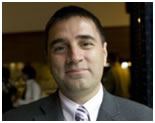 |
||
Home > TERATEC FORUM > Workshop 2
Workshop 2 - Wednesday, June 28 from 9h00 to 12h30
Health - Perspectives for Personalized Medicine in 2025
Human genetic challenges at the NGS era
Abstract : High-throughput sequencing technologies are now fundamental for the identification of disease-causing mutations in human genetic diseases both in research and clinical testing contexts. It is thus now possible to generate the full sequence of an individual at 30X (100 billions of data) in 3 days for few thousands $. More than 1,000 genes have been identified between 2010 and 2014 thanks to the early adoption of Whole Exome Sequencing (WES) technologies. However, despite this encouraging figure, the success rate of clinical exome diagnosis remains low (between 23% and 26%). It is due to several factors such as technical factors, mutation types, bioinformatics suite of tools and methods used to generate VCF files, and wrong variant annotation and non-optimal filtration practices.
In this presentation, I will describe the challenges and promises of new high throughput sequencing technologies; discuss the critical steps of the variants' annotation and filtration processes to highlight a handful of potential disease-causing mutations for downstream analysis; and finally, demonstrate how this could lead to the development of new therapeutic avenues.
 |
Biography : Professor Christophe Béroud (PharmD, PhD) has 27 years' experience in research laboratories and is an expert in bioinformatics and molecular biology. He is the creator of the UMD system as well as multiple databases and software, including Human Splicing Finder (HSF) and UMD-Predictor, to process and analyse NGS data. He has published 130 international papers (h-index=43) and has 5 patents. He is/was involved in multiple national and international committees and is/was the INSERM scientific team leader of various EU projects including RD-Connect.
He is full professor of Human Genetics in the Molecular Genetics Laboratory of the Aix Marseille University (AMU) and the APHM Hospital, head of the "Genetics and Bioinformatics" research team (INSERM UMR_S910), expert for the French Ministry of Research and Health and the European Commission, member of the Scientific committee of the Human Genome Variation Society (HGVS), member of the CSS2 at INSERM and communicating editor of the Human Mutation journal and member of the "Big data" committee at AMU. He has contributed to oncogenetics with the development of international reference databases for TP53, BRCA1/2 and MMR genes; prenatal diagnosis of rare diseases with the development of the ISET technology to isolate and study circulating foetal cells; identification of disease-causing mutations in the NGS context with the creation of most efficient in silico pathogenicity prediction systems; and to the diagnosis of rare disease (national expert centre for the diagnosis of congenital muscular dystrophies and dystonia). |
![]()
Register now and get your badge here
- TERATEC Forum is strictly reserved for professionals.
- Participation to exhibition, conferences and workshops is free (subject to seats available)
- On line registration is obligatory to attend exhibition, conferences or the workshops.
- The Vigipirate security plan being raised to its highest level, it is mandatory to register online in advance and come with an identity card order to participate in TERATEC Forum.
- The badge is free of charge and give you access to all events TERATEC Forum.
Find the technical workshops of the TERATEC Forum on the theme of HPC in health and download the presentations
![]() Teratec 2016 Forum : HPC technologies and applications in the healthcare sector
Teratec 2016 Forum : HPC technologies and applications in the healthcare sector
- Towards Digital Medicine in France by Francois SIGAUX, Directeur Scientifique Executif, CEA
- Precision Medicine, Big Data and Smart Cities by Suzanne HOLT BALLARD, Professor, OHIO UNIVERSITY
- Big Data in the french public health system by Emmanuel BACRY, Directeur de recherche au CNRS, Responsable de l’Initiative « Data Science » - Centre de Mathématiques Appliquées, Ecole Polytchnique
- Big Data for modern life sciences : challenges and solutions for Data Access (performances, flexibilty, security and privacy) by James COOMER, Technical Director, DDN - Peter CLAPHAM, SANGER
- Where are the bottlenecks of genome analysis today? by Ivo Glynne GUT, Centro Nacional de Analisis Genomico, CRG, Barcelona
- Les simulations HPC pour le décryptage des interactions moléculaires et l’obtention de nouvelles cibles thérapeutiques by Manuel DAUCHEZ, Professeur de Biophysique et Biochimie Computationnelle, UNIVERSITE DE REIMS CHAMPAGNE-ARDENNE
- Predictive and patient-specific numerical simulations of endovascular surgery for aortic abdominal aneurysms by ichel ROCHETTE, Director of Research, ANSYS
- Application of Optimization & CFD in Surgical Planning for Percutaneous Coronary Intervention by Silvia POLES, Senior Application Engineer, NOESIS Solutions
- Simulations for Abdominal Wall Reconstruction by Frédéric TURQUIER, PhD, Director Research & Development, COVIDIEN Surgical Solutions
- Interpretation of Clinical Exome : Le Big Data comme brique d’assistance aux choix thérapeutiques en oncologie by Philippe RAVIX Directeur Innovation SOGETI HIGH TECH
- Le calcul haute performance pour l'analyse de données de neuroimagerie-génétique en grandes dimensions by Benoit DA MOTA, Expert hpc&bioinformatics, ALLIANCE SERVICES PLUS - Edouard DUCHESNAY, research Engineer, NEUROSPIN
![]() Teratec 2013 Forum : HPC in Biology and Health
Teratec 2013 Forum : HPC in Biology and Health
- High performance computing and simulation in medicine: scope and challenges by François BALLET, MEDICEN
- The discovery of innovative therapeutic approaches: under the street light is not necessarily the right place to search by Dr. François IRIS, Chairman & CSO, BIO-MODELING SYSTEMS
- Can HPC help cure Pharma R&D? by Philippe GUILLET, Chief Geriatrician, SANOFI
- Le cerveau de cristal - Ce que nous révèle la neuroimagerie by Denis LE BIHAN, CEA
- Simulation & High performance computing: The challenge of computer-assisted surgery by Luc SOLER, R&D Director of IRCAD, R&D Director of IHU Strasbourg
For any other information regarding the workshops, please contact :
Jean-Pascal JEGU
Tel : +33 (0)9 70 65 02 10
jean-pascal.jegu@teratec.fr
Campus TERATEC
2, rue de la Piquetterie
91680 BRUYERES-LE-CHATEL
France